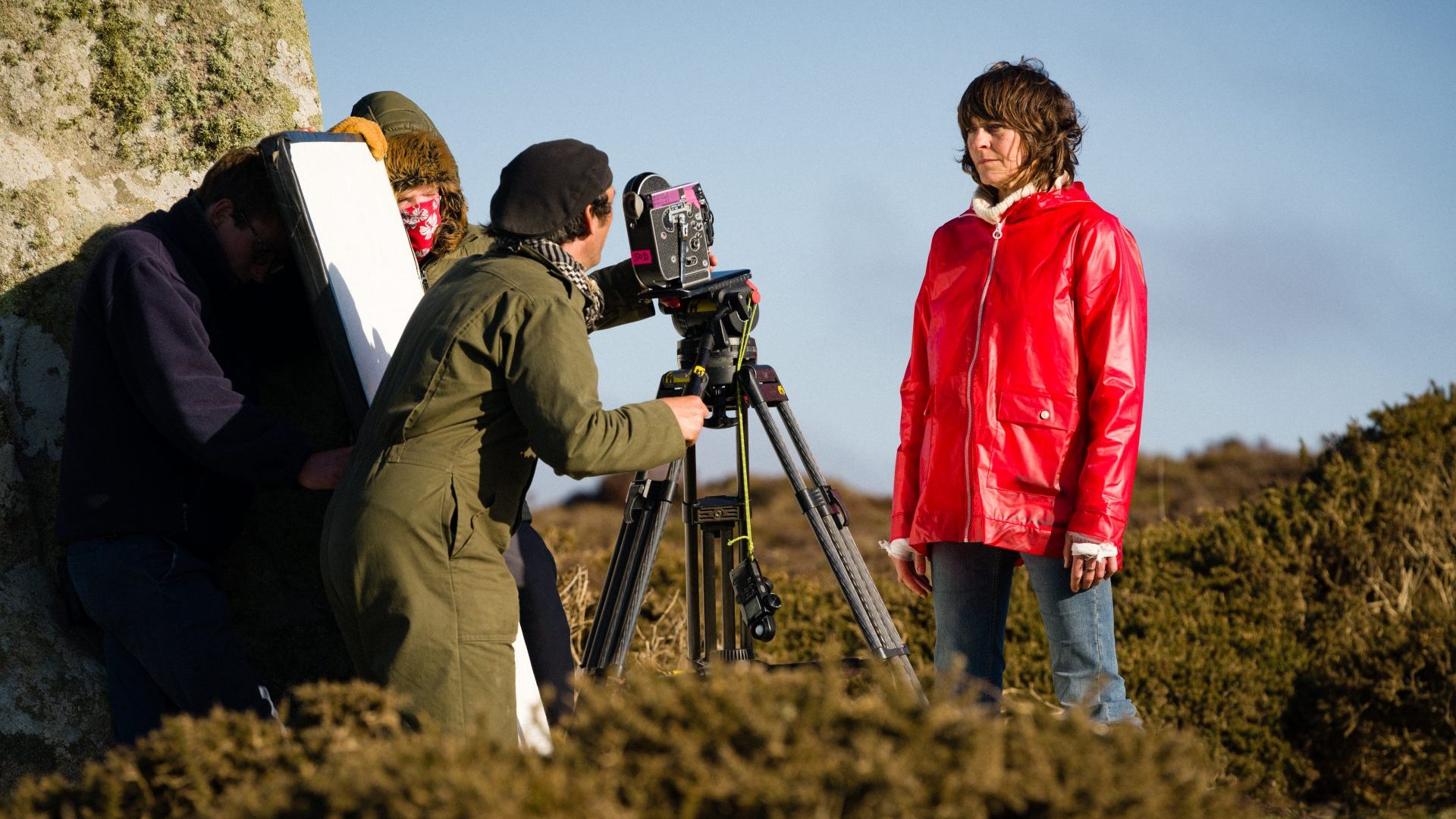Last year, video footage popped up on social media that appeared to show a group of people stealing lobsters from pots off the northern coast of Cornwall. A discussion ensued and, eventually, an explanation emerged. Rather than the lobster pots belonging to local fishermen – as many assumed – they belonged to a family who own a second home in Cornwall. A couple of times a year, the family pop down to their property, boating out to empty the pots and eat what they find.
The scenario could have been lifted from Mark Jenkin’s 2019 film Bait. Written and directed by Jenkin, the drama told of a struggling Cornish fisherman whose childhood home is sold to a family who use the property
for occasional trips away from their London base. Set against the pervading backdrop of financial insecurity and second home politics, Bait quivered with the tensions that exist between Cornish locals and incomers and, more broadly, with the naked injustices of social inequality.
Cornwall’s housing crisis has been a hot topic for some time. Second homeowners snapping up domestic properties have created an extraordinary surge in housing prices, depleting affordable stock for locals in the process. The crisis was further inflamed as the work-from-home culture adopted during the Covid pandemic led to people moving out of metropolitan locations in search of more pastoral horizons. Some headed to Cornwall, with Cornish towns like Fowey and Padstow experiencing an average property price increase of around £100,000 in just 12 months.
The situation hasn’t changed. Today the gap between incomes and house prices in the county is larger than in any other part of the UK. Furthermore, Cornwall is home to some of the most deprived areas in Europe. The 2020/21
End Child Poverty Coalition report notes that an average of 30% of children in Cornwall live in poverty. Padstow has its first food bank, and the Royal Cornwall Hospital in Truro plans to build new accommodation for staff struggling to find somewhere affordable to live. For Cornish locals, the thought of owning a home in the town where they were born is increasingly unlikely, and the argument for Cornish devolution is louder than ever.
“We’ve got no power, and why would the government bother to help us? They’ve got no interest,” says Jenkin, whose new film Eyns Men has just been released and is winning widespread acclaim. “And I think that whole thing about handing back power to Westminster from the EU – ‘take back control’ and all that – [we should] bring it all the way back. Let’s take it back to Lostwithiel. Let’s properly take back control. We need control over what we’re doing here, based on the resources that we’ve got.
“Our constitutional position is so strong in terms of devolution. There’s that regional and national pride here, and it’ll be interesting to see what happens in Cornwall for the next generation. Where are they going to live? It’s not necessarily to do with home ownership – I think culturally on these islands we’ve become obsessed with owning property. But will the next generation be able to even rent somewhere?”
We talk about the similarities between Thatcherism and the present-day Conservative ideologies that disparage public ownership. “It’s the same thing but with a different image, isn’t it? The ideology is all the same, just with different icing,” he says.
Bait allowed Jenkin to bring Cornwall’s tensions to a European and global audience. It won the 2020 Bafta for outstanding debut by a British writer, director or producer, was nominated in the Outstanding British film category and played at film festivals across Europe, winning in Stockholm and Wroclaw.
One of the feature’s key draws is its textural quality. Jenkin’s production
technique eschews digital filmmaking technology in favour of clockwork
cine cameras and spools of analogue film that require processing in chemical baths. He developed all of
Bait’s black and white celluloid reels himself, by hand, and the resulting imagery is grainy, flecked, and dappled with intermediate flashes of light. None of these marks and glitches are planned, but mistakes are welcomed, even encouraged. There’s an old carpet on the floor of his studio, and Jenkin tells me how its fibres often find their way on to the film, helping to speckle the emulsion.
How did these filmmaking processes come about? “I started using Super 8 as a teenager,” he says. “I was doing photography A-level, and I used to make these photo stories out of still images. My tutor said ‘you’re trying to reinvent film’ – with so many images per minute – and he encouraged me to shoot with Super 8. Even though I didn’t know it at the time, I liked the limitations of it all, not getting bogged down with too much footage. The film had a cost to it, and you had to commit to what you were doing.”
While other film-makers might do their best to get rid of all the blemishes that occur during the processing of the film, Jenkin tends to keep them all in.
“I really like all of that stuff. With a film image, there are infinite ways in which it can be imperfect, and I like the imperfections in art,” he says.
So is digital technology too unreal, almost hyperreal? “I think that if I’ve got the opportunity to do anything – which is what digital technology offers me – I’ll do nothing, because I can always think of something else to add,” he says.
Restrictions and limitations help Jenkin work, he says. Whether time-based, financial, or otherwise, it’s these pre-prescribed parameters that define an area in which the art is realised. “It’s a finite thing, just to think of something to do, and go and do it well,” he says. “If you’ve got a limitation, you’ve got to rely on the one thing that you have that no one else has got: your imagination.”
Shot around the disused tin mines of West Penwith, near Land’s End,
Jenkin’s follow-up to Bait is Enys Men (Cornish for “Stone Island”, and
pronounced Ennis Maine). Just weeks after release, its reception is
exceptional and there is talk of more awards. Empire magazine has called
Jenkin “a filmmaking force”, and described his film as “mesmerising”.
I ask him if he used the same slow-fi processes for Enys Men as he did for
Bait. “In some ways. It’s the same Bolex camera, it’s 16mm film, it’s shot
silently, post-synched again. But this time it’s in colour, so it’s lab-processed.”
The film’s publicity pack describes Enys Men as ecosophical. Jenkin explains that ecosophy is a specific philosophy that meditates on environmental harmony, and how producer Denzil Monk used the theory to describe an early draft of the script.
“The film is about the impact an individual has on the environment in
this particular place in 1973. The main character is observing a flower that
grows on an island off the coast of Cornwall and, through observing this
flower, she’s able to make observations about the impact we’re having on the
planet.”
While Enys Men takes inspiration from 1970s horror features, its references are as structural as they are artistic. “What I wanted to do was set up the limitations that would inevitably lead to it looking like something made in the 1970s,” says Jenkin. “So, using a camera that was made in 1976, using a film format that hasn’t changed much since the 1970s, using the same 1970s lenses. A small budget. If all of your tools and all of your context is the same then, to a certain extent, it’s going to look like those films.”
We move from filmmaking to Cornwall’s rich history of creativity. Aphex Twin, the St Ives School of Painting, the late, lamented Kneehigh Theatre company, and beyond. Why does he think the county fosters so much creative innovation?
“There are free-thinking people in Cornwall. Everybody’s very individual – although people work communally to help each other out with equipment,” he says. “I’ve never been short of people who would come and work on my films. The traditional Cornish healthy disrespect for authority goes through everything. If somebody’s doing something in one way, we’ll find a way of doing it our own way, and through that determination you come up with new
ways of doing stuff. With Bait, I think there was some surprise that this film
– which looks like nothing else – has come out of Cornwall. Of course it comes from Cornwall.”
Does the continuous influx of tourists into Cornwall dilute this Cornish individuality?
“Tourism’s the big problem. Tourism, not tourists,” says Jenkin. “We’re a magnet for gold-diggers who come in, make their money, and are gone again. Cornwall, this ancient, ancient land, that has had a quiet dignity and a pride, and has survived through all sorts of hardships.
“Suddenly, we seem to be abandoning all sense of history – and future – because of tourism. We can’t go on like this. We don’t have cultural protection, language protection – the language is so important in terms of identity. And funding.
“We haven’t got any of that anymore. The people making all the decisions now are an elitist government who see Cornwall as the bit of England that you go on holiday to, and nothing else.”
Added to this are the county’s high rate of poverty and lack of social care.
“We need intervention, but we don’t have that sort of government at the moment. Cornwall is being rebranded now as a playground for rich people. Most people in Cornwall tolerate tourism and accept that it’s part of our economy. But they certainly aren’t prepared to put their lives on hold for it,” says Jenkin. “The idea that Cornwall should be a service industry for people’s leisure time is, I think, one of the biggest disasters that Cornwall has ever faced.”
Enys Men is in cinemas now



